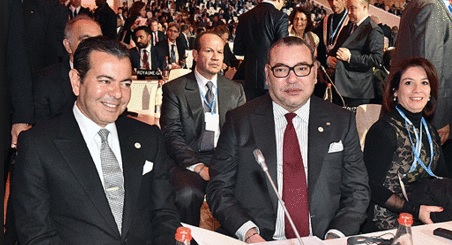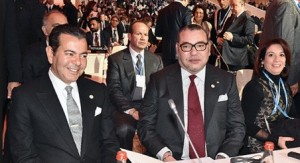MAP
Paris – HM King Mohammed VI addressed this Monday a speech at the 21st Conference of Parties to the UN framework Convention on Climate changes held in Paris.
Here follows the translation of the royal address that was read out by HRH Prince Moulay Rachid in the presence of the Sovereign:
Mr. President,
Distinguished Heads of State and Government,
Mr. Secretary General of the United Nations Organization,
Your Excellencies,
Ladies and Gentlemen,
Our meeting today in Paris is not and can no longer be one of those Summits and Conferences the community of nations regularly puts on the agenda of international relations.
Allow me to say frankly that it will no longer be the case because the Paris Conference, and the one my country has offered to host in a year’s time in Marrakech, will be instrumental in shaping the future which we are duty-bound to bequeath to our children.
Our children whom we do not want to see deprived of forests, oceans, coastlines and all these natural resources which are the hallmarks of mankind’s most valuable heritage.
A heritage which is threatened today because the international community has been unable – or unwilling – to come together in time and muster the means needed to have better control over its own destiny.
Today we are aware of the devastating effects of global warming on the planet and of the urgent need to match words with deeds.
Your Excellencies,
Ladies and Gentlemen,
What is at stake in our discussions is neither ideological nor diplomatic; it is not even economic in the traditional sense of our previous discussions and meetings.
We all realize now that the threat is global. Indeed, there is not a single country, region or continent that will be spared the consequences of climate change.
Doubt and skepticism are no longer acceptable. Nor will it be possible to continue using the alibi of wrong priorities.
The community of nations has turned its back on our children’s destiny and future for far too long.
For a long time, we have chosen to turn a blind eye. For far too long, we have delayed the moment of awareness. We have been playing around with hypotheses that have proved to be ways of evading the issue.
But facts are stubborn things. Ice sheets are melting. Sea and ocean levels are rising. Shores are gradually being eroded. Water resources are becoming scarce, agricultural output is threatened. Increasingly deadly floods come on the heels of droughts that are just as distressing.
That is why I have deliberately chosen to avoid technical analysis or academic discourse. Instead, I want to pay tribute to the scientists and specialists who are experts in the field.
We have to make sure that unanimity – which is not easily and instantaneously attainable in this area – does not become a deal breaker that would justify foot-dragging by some and the illusions arising from the inaction of others. In this respect, we must build patiently and resolutely on what is possible and attainable. It is only through effective action and tangible results that we can overcome reluctance and resistance.
Your Excellencies,
Ladies and Gentlemen,
In keeping with this perspective – that of realism, anticipation and action – I should like to mention the strategy the Kingdom of Morocco has been implementing for more than half a century.
Let us begin with water, the source of life and a crucial, daily concern for Moroccans. What would have become of Morocco in this respect, had it not been for the dam-building policy, which is a ground-breaking, far-sighted policy initiated in the early 1960s by my revered father, His Late Majesty King Hassan II. May he rest in peace.
Recognizing the importance of this key accomplishment for Morocco’s future, I have sought to reinforce it, and as a result Morocco now has 140 large dams, nearly a third of which have been built during the last 15 years.
Thanks to this policy, Morocco is dealing successfully with the effects of drought whereas, in some developed countries, a mere delay in seasonal rainfall gives rise to a warning that an exceptional, severe drought is feared.
The Kingdom’s committed action in this respect is also illustrated by the development of watersheds which make it possible to channel water without destroying or disrupting ecosystems.
Morocco has also developed a responsible fisheries policy, which it defended – albeit with some difficulty – when negotiating with its partners, to protect its fish stocks.
Your Excellencies,
Ladies and Gentlemen,
Since the world became aware, in Rio in 1992, of the urgent need to address climate change, the Kingdom of Morocco has resolutely sought to ensure that its proactive policy on sustainable development and environmental protection is in line with the international community’s global effort. To this end, it has introduced a series of constitutional, legislative, institutional and regulatory reforms.
The Environment Charter, the Green Morocco Plan, the Green Investment Plan, the ban on GMOs and the new law on plastic waste clearly reflect our commitment and our consistent action.
More recently, and in keeping with the same approach which favors long-term objectives, the Kingdom of Morocco has become one of the main actors in the energy transition, in the world and especially on the African continent.
Therefore, the objective of securing 42% of the country’s energy mix from renewable sources by 2020 has recently been increased to 52% by 2030.
Morocco’s ambitious, substantial “Intended, Nationally Determined Contribution” under the United Nations Framework Convention on Climate Change confirms the Kingdom’s avant-garde approach.
Building on this irreversible commitment, Morocco is bidding to host the COP 22 in Marrakech in 2016.
That is why, on 20 September, together with His Excellency President François Hollande, I made the “Tangier Call”, reflecting our commitment to work hand in hand for the success of these events that are crucial to our destiny.
It is important to ensure that one stage leads to the next. The road ahead will be long as habits will have to be changed, priorities set, new technology invented and regular assessments and checks accepted.
Your Excellencies,
Ladies and Gentlemen,
The climate change predicament is the ultimate injustice suffered by the most vulnerable. The consequences of climate change are affecting developing nations as much as – if not more than – developed countries, especially the least advanced African and Latin American States and small island States.
Alarm bells have been heard, even by the deaf. There is awareness across the board. Developing countries are progressing, albeit at their own pace, using their own strategies. They are moving forward, charting their own course, amid constraints which can no longer be ignored. First, there is the need to make sure their populations enjoy decent living conditions.
Is it fair to advocate frugality when one already has everything? But when one has little, is it a crime against the planet to want more? Does it make sense to describe a type of development as “sustainable” when it leaves the majority of people living in poverty? Is it appropriate that prescriptions for climate protection be dictated by those who bear the greatest responsibility for global warming?
The African continent deserves special attention. The whole of Africa is experiencing an awakening. Africa is discovering itself and is gaining confidence. It is therefore in Africa – the continent of the future – that the planet’s future will be decided.
In this context, promoting the transfer of technology and raising funds, particularly for the benefit of developing countries, is fundamental. Above all, let us guard against compelling these countries to choose between economic development and the protection of the environment.
Developing countries’ commitment to combat the effects of climate change must also take into account their respective development models as well as their inhabitants’ customs.
Consumer lifestyles and habits in the countries of the North regarding cosmetics and food, for instance, produce large amounts of non-degradable waste.
Likewise, in developing countries, the fight against plastic bags, for example, constitutes a real challenge. People do not think of getting rid of these bags but rather of filling them to meet their needs. It is a question of education.
That is why binding regulations are needed in both cases.
The fight against waste should not be synonymous with “techno-phobia”, with a rejection of progress or a return to “the Stone Age”. On the contrary, technological advances should be used effectively to reduce the impact of global warming.
Mr. President,
Your Excellencies,
Ladies and Gentlemen,
A genuine, inclusive international consensus is imperative. It requires that we support developing countries in their endeavor to fully embrace the Climate Action agenda.
The Paris conference gives us the opportunity to consolidate a comprehensive, operational, balanced, universal legal instrument that will make it possible to keep global warming below two degrees Celsius and move towards a low-carbon economy.
I would like to conclude by wishing this Conference every success. I also want to thank President Francois Hollande and France for the commitment and dedication they have shown to make the COP 21 a successful meeting that makes history and fosters hope.
Maintaining this conference and ensuring its success is the most eloquent tribute we can pay to the French people, who have recently been affected by despicable terrorist attacks. This is the best response to obscurantism and to the enemies of humanity.
Thank you.








